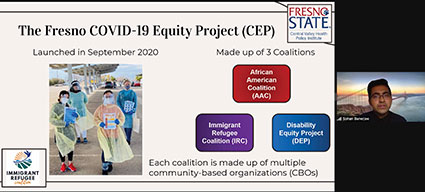To reach residents who tend not to trust the county health department, the COVID-19 Equity Project was created in Fresno County, California, in September 2020 as a neighborhood-level response team of a diverse group of community health workers. The project is made up of the African American Coalition, Immigrant Refugee Coalition and Disability Equity Project, each of which includes multiple community-based organizations.
To prepare the community health workers to go out into the community, the Central Valley Health Policy Institute at Fresno State created a five-day virtual training.
“We’re reaching a diverse population of Fresno County residents, so we also employed a very diverse range of community health workers,” said Sohan Banerjee during a Tuesday APHA 2021 session on “Community Health Workers Confronting COVID-19 Health Disparities.” They recruited community health workers from a variety of races and ethnicities but also education levels and people with disabilities.
Banerjee, a research assistant at the institute, explained how the training was developed and implemented so that other public health organizations could learn from its success.
The diversity was “amazing for impact,” he said, but it created challenges for training. The creators knew they had to focus on how to make the training accessible to all levels.
 The five-day virtual training was offered as English and Spanish versions, with supplemental materials provided in other languages. ASL interpreters were provided, and the organizers used the Zoom platform's "Spotlight" feature so the interpreter would be visible on screen throughout the training.
The five-day virtual training was offered as English and Spanish versions, with supplemental materials provided in other languages. ASL interpreters were provided, and the organizers used the Zoom platform's "Spotlight" feature so the interpreter would be visible on screen throughout the training.
The training began with an introduction to COVID-19 and how Fresno County was affected, followed by lessons on infection control and the proper use of personal protective equipment.
“We weren’t afraid to show them the science because we thought having that background would really help them,” Banerjee said. “But importantly…we adjusted that literacy level to match all education levels.” In turn, the community health workers were prepared to answer community questions about the disease and the vaccines.
Next, they provided lessons on contact tracing and REDCap contact tracing database management and HIPAA. They also gave a Tech 101 lesson.
“We had a very diverse cohort, and some didn’t know much about how to use technology so we taught the basic stuff like email, Zoom, how to navigate the Fresno County Department of Health website,” Banerjee said.
Finally, they taught about local social support resources, so the CHWs could refer people as needed.
After the training, the COVID-19 Equity Project provided continuous support through scheduled online “office hours” in which CHWs could ask questions. The institute also created follow-up training modules on topics such as mental health, health equity and justice, and the various vaccines as they rolled out.
From September 2020 to February 2021, the project provided outreach and education to 6,134 people. The training model is shareable, and two other California counties have already adopted it, Banerjee said. Post-COVID, the coalition hopes to use the Equity Project model to address chronic disease management.
As Banerjee illustrated, project takeaways include:
- teaching the science;
- creating widely accessible training; and
- providing continuous long-term support.
"Then, let community health workers be the experts on cultural issues and talking with the community,” he said. “We’re just there to provide them the science and the public health.”
Photo by Melanie Padgett Powers